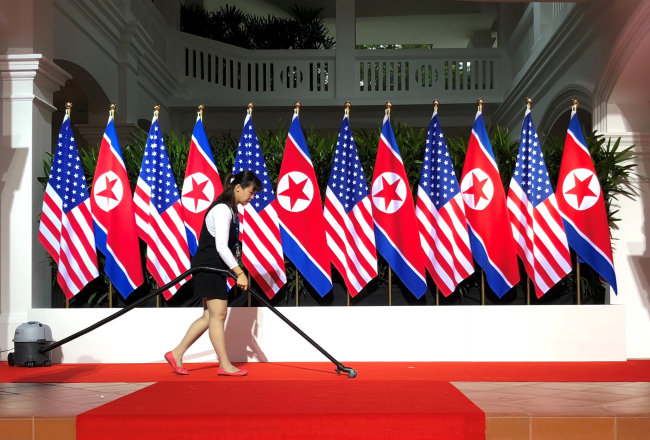Donald Trump and Kim Jong-un will make history on Tuesday, becoming the first sitting US and North Korean leaders to meet, shake hands and negotiate to end a decades-old nuclear stand-off.
The extraordinary summit -- unthinkable only months ago -- comes after the two nuclear-armed foes appeared on the verge of conflict late last year as they slung personal insults and Kim conducted nuclear and missile tests.
In a series of tweets early Tuesday, Trump indicated that summit preparations were "going well and quickly".
"We will all know soon whether or not a real deal, unlike those of the past, can happen," he tweeted -- before hitting out in a subsequent post at "haters & losers" who see the summit itself as a risky up-front concession to Kim.
Pointing at the recent release of three American hostages and Pyongyang's pledge to refrain from further nuclear or missile tests, Trump charged that "these pundits, who have called me wrong from the beginning, have nothing else they can say!"
"We will be fine!" he tweeted.
 |
A worker vacuums the stage at the spot where US President Donald Trump and North Korea`s leader Kim Jong-un are expected to meet and shake hands for the first time at the start of their summit at the Capella Hotel (Reuters) |
- Hugely symbolic talks -
The pair -- Kim in his 30s and consolidating his dictatorship, Trump in his 70s and struggling to bend Washington to his impetuous will -- are unlikely protagonists, both instantly recognisable and larger-than-life.
But their work this week is deadly serious.
Washington and Pyongyang are still technically at war, even if the mortars, carbines and gunships of the bloody 1950s conflict have long since fallen silent.
And the totalitarian regime has made rapid progress towards marrying nuclear and missile technology that would put Los Angeles, New York and Washington within striking distance of a nuclear holocaust.
The United States says that is unacceptable and will be dealt with, one way or another.
But for North Korea the mere fact of the talks is a hugely symbolic advance.
For its leader, standing as an equal beside the US president in front of a phalanx of cameras is a goal the pariah state has sought for decades, with critics charging that it legitimises one of the most ruthless regimes.
On Monday evening Kim -- accompanied by a phalanx of bodyguards and his personal television crew -- took a night-time stroll on the Singapore waterfront, even posing for grinning selfies with the city-state's foreign minister.
- 'Brighter future' -
Yet it remains far from clear that Pyongyang is willing to give up its nuclear weapons, which it says it needs to defend itself against a US invasion.
On the eve of the meeting, aides from both sides were still scrambling to narrow yawning differences over "denuclearisation", which means vastly different things to the two parties.
Trump, who is due to leave Singapore on Tuesday evening, will use what he says are long-honed instincts to see whether Kim is bluffing, buying time or serious.
Secretary of State Mike Pompeo said on Monday that the United States was willing to offer the regime "unique" security guarantees, to "provide them sufficient certainty that they can be comfortable that denuclearisation is not something that ends badly for them".
Kim and Trump will first meet one-on-one in a closed session, before a larger meeting with key advisers, US officials said.
But Pompeo signalled that the summit was likely to be the start of a longer process of negotiation, and warned the United States would not be "duped", with nothing less than complete, verifiable and irreversible denuclearisation considered. (AFP)







![[Today’s K-pop] Blackpink’s Jennie, Lisa invited to Coachella as solo acts](http://res.heraldm.com/phpwas/restmb_idxmake.php?idx=644&simg=/content/image/2024/11/21/20241121050099_0.jpg)